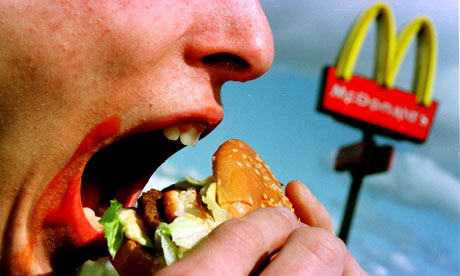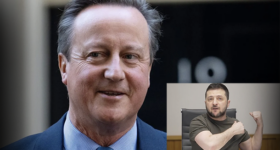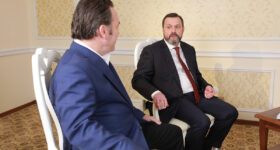
By Peter Sterry
21st Century Wire
Extraordinary – another out of court settlement – this time by ITV over the notorious ‘Schofield’s List’. Is this getting out of hand?
Notice the pattern emerging. All deep pockets, all settling out of court. It stands to reason though, if you’re going to sue, because lawyers need to be paid and paid a lot – so it makes perfect sense from the plaintiff’s point of view to go for the fattest targets. All very sensible, wouldn’t you say?
What’s becoming very clear, very quickly here, is that this is no ordinary libel case and the media atmosphere surrounding the case is a labyrinth of smoke and mirrors, set on the background of a highly charged political and social debate involving this nation’s most prestigious and long-standing institutions.
Yesterday afternoon on the UK Column Live daily show, 21st Century Wire colleague, Patrick Henningsen, effectively re-coined the term to describe this case as, “McLibel” – a transplant on to Lord McAlpine’s current ‘litigatorial charge of the light brigade’. But the ‘Mc’ similarity in the name is not all that draws comparison here, as we’ll explain.
Although McLibel 2.0 has been reported throughout the media, very few, if any, media moguls are challenging the technical basis of it. None seem to be able to state categorically who, and exactly how, and on which technical basis the BBC and ITV have libeled this seemingly powerful establishment figure.
Act One: ‘The Case of the Missing Leak’
Nothing about this case makes much sense.
We all watched the Newsnight broadcast that Friday night, with many viewers expecting that a ‘top Tory’ name would be revealed in relation to their investigation into the North Wales child rape and abuse scandal. The BBC’s lead investigator Iain Overton from the Bureau of Investigative Journalism (BIJ), and Channel 4’s Michael Crick – both tweeted earlier that day something to effect, ‘If all goes well…’ blah, blah etc, ‘a name will be revealed on the programme tonight..’. Wonderful. Thank you Mr Crick for playing your role. Only it wasn’t revealed on the programme. The BBC did not broadcast any name, and in the end Lord McAlpine’s name was never mentioned on Newsnight – a fact conveniently left out of the media conversation – and for good reason. A masterful stitch-up, and a PR slight of hand that would dazzle Eddie Bernays.
The current party line is that the whole fiasco began with a cock-up by the police – Lord McAlpine was not the “McAlpine” apparently identified by the police to Steven Messham, we are told that it was probably Alastair McAlpine’s cousin the late ‘Jimmie’ McAlpine, who died in 1991. Another case of ‘mistaken identity’, as it were. So why not sue the police? Hmmmm. “Must have been Jimmie McAlpine”.
The BBC Scotland have been asked to conduct another ‘internal investigation’ (the BBC are very adept at investigating themselves when there is any alleged wrong doing) into what actually took place, and naturally their chief snoop into this affair, a rather affable chap named Ken McQuarrie, seemed to come up with everything except the one thing the license paying public was actually interested in – who leaked McAlpine’s name?
So let’s say it wasn’t the BBC, then was it the BIJ? If not, was it Michael Crick? If not, was it the police? Can anyone actually tell us plebs who done it?!? Apparently not – and that ladies and gentlemen, is the foremost, biggest problem with the BBC rushing to pay the McLibel 2.0.
Conclusion: The BBC’s Newsnight programme in question was slapped together in just 5 days, in what has turned out to be a very elaborate smokescreen designed to externalise the issue of child abuse in high places and provide much-needed PR cover for their institutional cover-up of rancid asset Sir Jimmy Savile, and finally to distract the public from its willful failure to investigate itself properly – not that it should be ‘investigating itself’ anyway, it’s a public broadcaster. It appears here that the maligned actor in this drama, Lord McAlpine, was merely a tool used by establishment in order to save the BBC from hemorrhaging public confidence and to shield it from other emerging scandals of a similar nature.
Look at the results – it worked. The BBC did the usual ritual of paying off an outgoing DG, and hired a new safe pair of hands. No one is talking about Savile, and no one is wanting to look for skeletons in the BBC’s basement. Job done. And a good kick in the teeth to the victim Steve Messham – let that be a lesson for any future whistleblowers, right?
There is one aspect of this clever plan which will come back to bite the establishment, however. They used a child abuse victim, Steve Messham, in order to pacify their institutional desires. The public will never forgive them for that.
Remember McLibel 1.0, when McDonalds dragged that poor English couple through the courts for 20 years? We’ll get back to that in a minute…
Act Two: Scholfield’s List
This is more or less, a repeat of Act One, where the nation’s second largest British broadcaster, ITV, has agreed to pay Lord McAlpine £125,000 in damages, plus legal costs, in another out of court settlement over This Morning presenter Phillip Schofield’s alleged onscreen stunt confronting David Cameron, a stunt we are told, had linked several Conservative politicians with allegations of child sex abuse.
The only problem here is that this writer, nor anyone else I know, saw any name on ‘Schofield’s List’. Who was actually linked to child abuse? It is alleged that some could see – by freeze framing the show’s recording, names on the list handed to PM David Cameron. I still don’t know who the names were. Does anyone? I did a ‘Schofield 5 minute’ super search on the internet for those names – and I cannot find them! So how did ITV libel McAlpine then? Are we getting ridiculous?
On another legal caveat, it’s also worth pointing out that if a member of the public passes information to an elected representative listing people who may possibly be involved in serious crime – then that official, in this case David Cameron, is responsibly to then pass on this information to the police.
Did this happen? I believe it did not. What are the implications of that?
Still there is not a court in the land that has ruled yet on whether or not Lord McAlpine was libeled by both the BBC and ITV. In the end, it really does not matter whether he was, or wasn’t, because that’s how things work in the injury lawyer. Indeed, decisions were made behind closed doors in both broadcasting institutions to pay out – most likely in order to avoid a drawn out court battle that might sully the broadcasters’ media reputation somewhat, but would it really? After all these things happen in our society every day.
Conclusion: In case of ‘Schofield’s List’, again like the BBC, the public was not aware of Lord McAlpine’s name being mentioned on ITV’s This Morning program. On both counts, the public was only made aware of the name after someone within those media houses, the government, or the police – had leaked them. If a libel case is to be decided on its proper legal merits, then the police and the courts need to begin with finding out those individuals who actually leaked them.

This makes the threat to sue 10,000 Twitter users who McAlpine’s law firm RMPI believe had ‘linked’ their client’s name to the scandal, something built on a house of cards. Find out who is responsible for the leaks first. That would be the proper way to go about this.
Chasing ghosts on Twitter does nothing to find out how his name was leaked in the first place – which started that chain of events, propagating information online.
There we can achieve an accurate trail of accountability.
Act Three: ‘Trial By Twitter’, or echoes on Twitter?
Lord McAlpine and his legal attack team were seen to some out swinging last week, with cries of ‘Trial by Twitter‘. But before we dissect what did or didn’t happen on Twitter, it’s important to understand the nature of this particular social networking tool. It’s amazing how few people in the media and government actually do.

When it comes to news, Twitter is a long way away from a newspaper or magazine of record – it’s a hyper active forum – a 21st century digital ‘echo chamber’. In IT terms, it’s a crowd-sourced, information and headline aggregator. For members of the public who aren’t aux fait with the social networking tool, Twitter also allows users to use ‘hash tags’ or #tags in order to group conversations which are taking place within the Twitter information cloud community.
Phrases on Twitter are the lowest common denominator there is when it comes to information. Twitter functions as the online equivalent of a social info-feed, complete with zero depth, zero analysis and as is the case so often – zero credibility when it comes to any reports. Even a headline from CNN on Twitter must be clicked through to a substantial article if one is to believe the headline. It’s highly limited.
After the alleged Newsnight leak took place, and Lord McAlpine’s name was entered into the tertiary conversation surrounding the show, his name began to trend massively on Twitter. This is how Twitter works. Twitter is only limited to 160 characters, and doesn’t really quite qualify as a news publisher – more like a rumour mill.
The other peculiar aspect about Twitter which separates from the others is how it works on highly a linear timeline, where users are almost exclusively attentive to Tweets which are less than 24 hrs old, and many users with large ‘follow’ lists only see what is less than 1 hr old. After this, it’s almost ancient history for Twitter users, because users are only reading and responding to happening, what is breaking, or is trending – in short, what is happening now. Old news, and opinion is constantly being overwritten by the cloud community of over 500 million active users, which ironically, gives very little weight in terms of public impact as to what ideas actually churn on that platform.
Sadly, it pales in comparison to a major website, newspaper, a well distributed book, or a large TV broadcaster. For any serious opinion forming information on issues, news or op-ed, all Twitter users are forced to migrate over to larger news websites who can display more than 160 characters at a time in order to test the public perception of any said news report or rumour – sites like the Independent, The Times, or even The Drudge Report.
A Tweet by a high enough profile person with many followers, like a celebrity for instance, would be picked up by many readers within a short space of time, so if a celebrity slanders another celebrity, it would move up the media tree very quickly and into the Corporate Mainstream Media sphere – here a public impact could be measured because it was large enough. Should other Twitter users actually commenting on what is actually happening in real-time be considered libel then? For banal subjects such as pop gossip, it’s taken very seriously by adolescents and teenagers who are following the movements of pop artists, Paris Hilton, and who want to know where Kim Kardashian is shopping that afternoon, or what Ronaldo did after Wednesday evening’s match.
Can a personal be slandered or libeled on Twitter? Absolutely. But what constitutes a libel with the narrow margins of Twitterland versus, let’s say, the front page of the Sun newspaper – are two very different things indeed. Firstly, there is the issue of intent. If a publication runs an article saying that ‘Mr X’ is perpetrating a serious crime – like paedophilia or child abuse, going on to describe the allegations in detail, along with claims of evidence, then Mr X has the right to challenge the both the author of the article, and the publication on the veracity of the allegations in question. In this instance, the intent of publication was clear – to expose the crimes of Mr X. But if the publication does not have the evidence to support such allegations, then Mr X’s libel claim is likely to succeed, and the newspaper’s subsequent claims would then be deemed malicious and defamatory by the courts of justice. The issue of intent is much murkier with regard to mentioning someone’s name on Twitter – especially if Mr X’s guilt or innocence in relation to the media expose was inconclusive at the time. Twitter users were simply commenting in real-time on what they were seeing, without any premeditated malicious intent.
Other recent reports regarding ‘Twitter libel’ cases can be found here, here and here.
Conclusion: How information is presented and distributed on Twitter – and how society defines this, is a conversation which certainly goes hand in hand with McLibel 2.0. To equate Tweeting and ReTweeting with libeling McAlpine, not only over-rates the significance of Twitter in terms of public opinion forming, but sets a rather dangerous and slippery precedent, where we have a law firm issuing a blanket threat over the public, while the basis of the entire chain of events involving Lord McAlpine – has been hidden from public view via a series of out-of-court agreements, namely, the BBC and ITV thus far. Again, we come back to the fundamental question in all of this – who leaked the name?

Act Four: Remember ‘McLibel’ 1.0?
Ahhh, those were the good old days – pre-internet, when the strong preyed upon the weak and under-resourced. It was known as the “McLibel case”, where a lawsuit was filed in English courts by the humble McDonald’s Corp against environmental activists Helen Steel and David Morris (“The McLibel Two”) over a pamphlet critical of the company’s environmentally destructive footprints overseas. The original case lasted ten years, plus another 10 for ECHR Appeal – making it the longest-running case in English history, subsequently made famous in McLibel, by filmmaker Franny Armstrong.
Although the goliath character in this case, McDonald’s, won two hearings of the case in English courts, the drawn-out public nature of the litigation embarrassed the company. In short, it backfired in the long run. For McDonalds execs, seemed like a good idea at the time.
After Goliath’s lawyers had collected all their fees and were hence finished destroying David’s life, the European Court of Human Rights (ECHR) then ruled in Steel & Morris v United Kingdom – that the pair had been denied a fair trial, in breach of Article 6 of the European Convention on Human Rights and that their conduct should have been protected by Article 10 of the Convention. The court awarded a judgment of £57,000 – against the UK government. In the end, McDonald’s itself was not involved in, or a party to, this verdict.
Conclusion: After the state’s own corrupt justice system was finished protecting the rich and powerful McDonalds, and abusing the poor free speech activist, the state ended up paying the victim in the end.
The left wing of the establishment used Leveson in order the hijack free press and speech. Now we have the right wing of the establishment using the Savile and Newsnight incident to curtail free speech and to cover-up the disgusting problem on organised institutional paedophilia, not only in the BBC, but in government, and especially within in the child care industry itself. Shame on our leadership for allowing this issue to be reversed back into the shadows through their clever spin and cover.
Wikileaks is being shut down for publishing public interest information, and it’s founder put under permanent house arrest, and now Twitter is in danger of being nothing more than a shopping guide for commercial news, shoes, and handbags – because users are being intimidated for doing nothing more than commenting. What’s next, ‘Trial by #HashTag’?
The establishment don’t like, and never have liked, the horrid internet, because of what it represents – an affordable, endless community of open source networks and information. A vulgar concept for those who have successfully monopolised and controlled media for hundreds of years.
A local carpenter named Paul, whom I often share the odd pint with at me local in Crouch End, said to me yesterday, “I think that Lord McAlpine is over cooking the pie, and that’s not on, son.”
That is the crux of the matter, as we see it.
RELATED: The Prince and the Pedophile: What Are Charles’ Connections to Jimmy Savile OBE?
RELATED: The BBC, Lord McAlpine and ‘The New Machiavelli’ Book
RELATED: Are Secretive Cabals Keeping Us in the Dark Over UK Child Abuse?
















